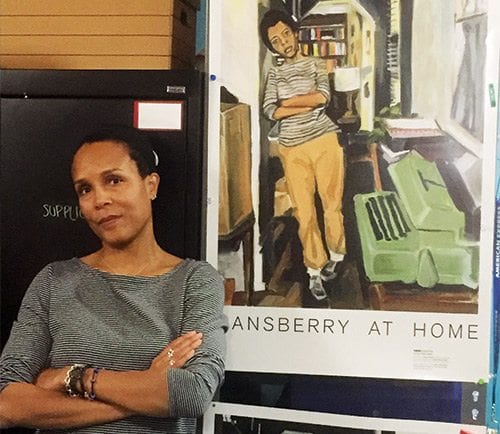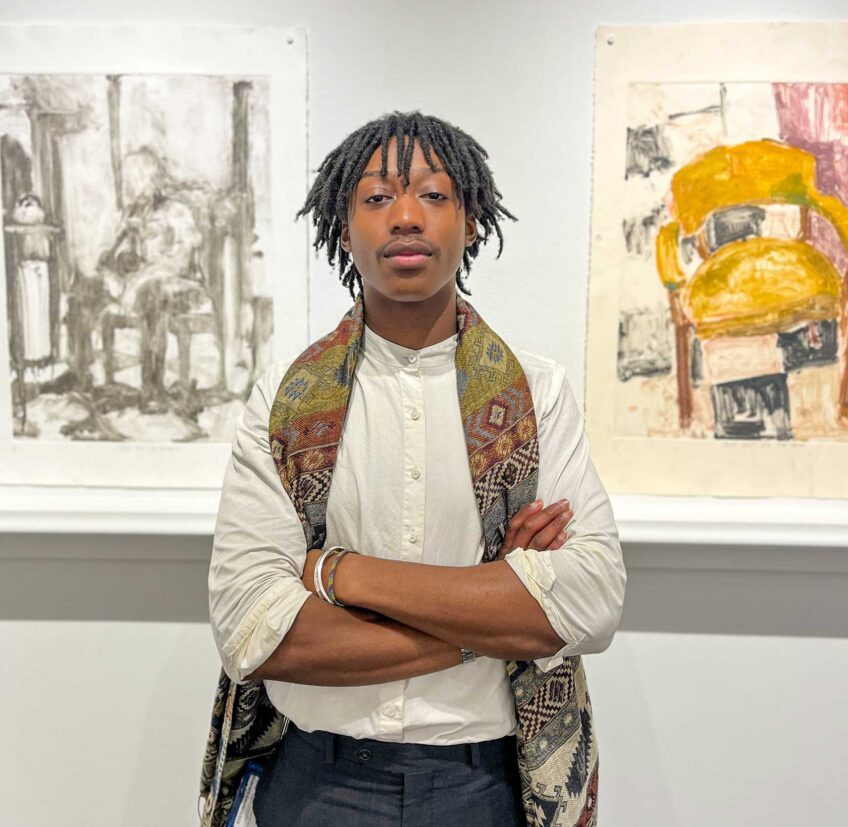‘Sighted eyes/Feeling heart’
Writer Lorraine Hansberry topic of forthcoming documentary

One of the main reasons I became a filmmaker was to bring Lorraine Hansberry’s story to the screen. My motivation for that audacious goal in my mid-20s — with no experience working on any film or knowing anyone who made films — was solely based on my desire to introduce people to the late writer best known for her first play, “A Raisin in the Sun,” and for them to hear her extraordinary voice.
I’m not sure exactly how I decided to leave my associate program manager job — working on the AT&T Communications account at the cutting-edge marketing company on the waterfront in the late 1980s — to become the receptionist and production secretary at the small company in Watertown that made science, technology and nature documentaries primarily for public television, but it was a convergence of motivations. The most seminal thing happened years before, thanks to my grandmother, when I was 17 in my hometown of Harrisburg, Pennsylvania.
My paternal grandmother was very conscious of the fact that my sister and I were growing up in a rather isolated and primarily white suburban community. There was at least one residential community that had a sign up describing the homes as “restricted,” and most swimming pools were off-limits to black people.
But I didn’t think I was starved for role models until one day my maternal grandmother drove out to the suburbs to pick us up and take us back into the city to see the play “To Be Young, Gifted and Black.” This play, crafted from Hansberry’s writings after her death, was a revelation! I wondered how it was that I didn’t know about this woman who shared thought and experiences I had, who noticed things that I did, who was black like me.
Hansberry died when I was four years old, and by the time I was reading “Ebony,” and sometimes “Jet,” she wasn’t mentioned anymore. Her story, but especially her voice, became filed in my memory as I went on with my life — finishing my senior year of high school, graduating from college and launching and ending a career in advertising and direct marketing to make a film about a woman who inspired me. It is incredible to think that the film on which am working now in 2016 will be the first feature documentary about Lorraine Hansberry.
On the web
If you would like to support the Lorraine Hansberry Documentary Project, which includes the first feature documentary about Hansberry’s life as well as the content-rich website and educational materials planned for formal learning and afterschool programs, you can donate to the project via Filmmakers Collaborative.
Power of art
My documentary, “Sighted Eyes/Feeling Heart,” will take the audience on a journey through Lorraine Hansberry’s intense and eventful life to tell a story of one woman who, from a young age, was compelled to fight against injustice of all kinds, ultimately choosing art — the theater specifically — as her chief vehicle. Hansberry believed, “All art is ultimately social; that which agitates and that which prepares the mind for slumber.” Her overnight success helped transform the face of American theater and catapulted her into the spotlight.
Born in 1930, her impassioned and courageous voice drew from the worlds she knew — the struggling, yet fiercely determined community in Chicago’s Depression-era South Side, the vibrant and radical street corners of post-World War II Harlem and the boundary-defying milieu of 1950-60s bohemian Greenwich Village. While publicly outspoken, Hansberry also was racked with many fears, loneliness, self-doubt and conflicts about her sexual identity. She struggled to write amid the commotion of sudden celebrity and, like many African American artists of the period, juggle the needs of her craft and personal choices while serving as a civil rights spokesperson.
After witnessing the intense violence against young civil rights activists, Hansberry concluded near the end of her life that words and talking may not be enough to change society. In 1965, she died at age 34, just six years after “A Raisin in the Sun” premiered and as her second Broadway play, “The Sign in Sidney Brustein’s Window,” was in production. “Her commitment of spirit,” wrote Martin Luther King, Jr. for her funeral service, “her creative literary ability and her profound grasp of the deep social issues confronting the world today will remain an inspiration to generations yet unborn.”
Enduring legacy
This film, which I’m making with filmmakers Jamila Wignot and Randall MacLowry, will explore Hansberry’s legacy not only as the author of the play that inspired generations of African American theater professionals, but also as a passionate, complex public intellectual and activist whose voice — 50 years later — remains a relevant and empowering call for her country to live up to its promise of equality and justice for all.
The title for the documentary “Sighted Eyes/Feeling Heart” comes from a keynote speech Hansberry delivered at the First Negro Writers Conference in New York about two weeks before “A Raisin in the Sun” opened on Broadway: “…one cannot live with sighted eyes and feeling heart and not know and react to the miseries that afflict this world.”
I was originally drawn to Lorraine Hansberry because what I knew of her story years ago empowered me as a young, black woman with few role models to launch the career I now have. I am no longer an aspiring filmmaker, and Hansberry is no longer an icon of achievement. I have a much more complex understanding of her life, art and times. What has not changed is that Lorraine Hansberry’s words continue to inspire me. Martin Luther King, Jr. was right about her.




![Banner [Virtual] Art Gallery](https://baystatebanner.com/wp-content/uploads/2024/04/AmberTorres_4-667x848.jpg)

